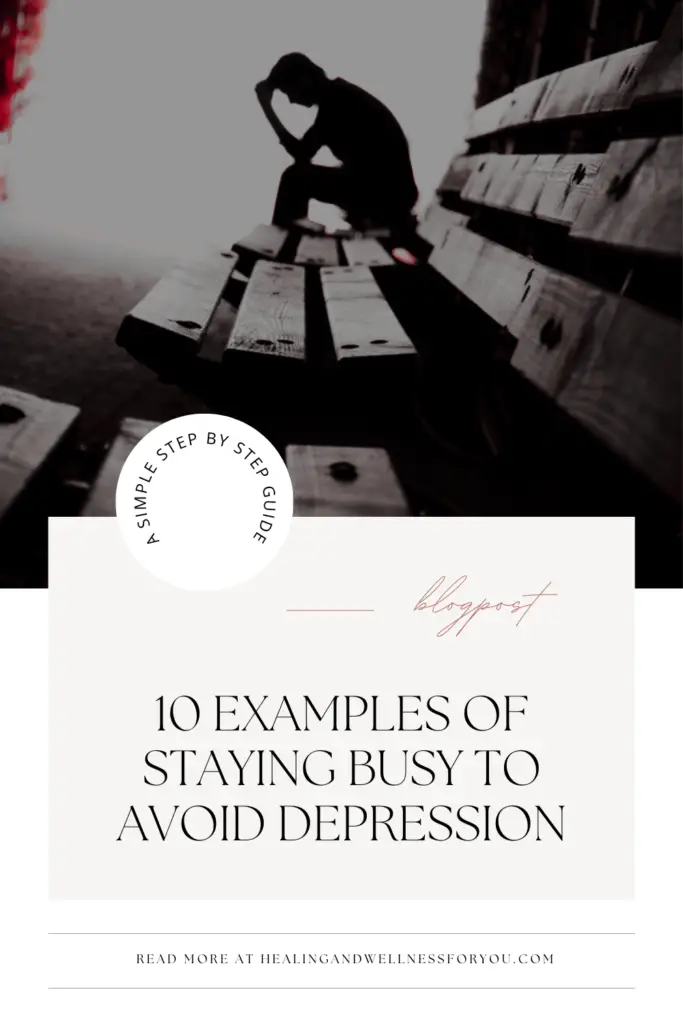10 Examples of Staying Busy to Avoid Depression
10 Examples of Staying Busy to Avoid Depression

You said yes to getting coffee with a close friend, but when the moment comes to get out of bed and get ready, you’re overcome with dread. You have no interest in catching up with someone you know you’re always happy being with and are exhausted even though you got 10 hours of sleep. Your therapist told you to honor your emotions, so can that be a good enough excuse to cancel your coffee date? Or do you want to get coffee in hopes of avoiding your feelings?
Many people keep their schedules busy with activities and responsibilities to avoid facing the emotions or heavy thoughts they are experiencing. This can be masked with the facade that we are being productive and successful. But there is a difference between doing something to constructively pursue our goals and using busyness as a distraction from our feelings. How do we tell the difference between avoiding our emotions and fighting against depressive symptoms? Navigating this balance can be tricky and takes some mindfulness, but it can be crucial for our well-being.
Key Takeaways
- Recognize if we’re using busyness to dodge negative emotions.
- Being constructively busy can benefit our mental health.
- Balance is critical to ensuring our busyness is healthy and purposeful.
What Is Depression?
Depression is a mental health condition that affects how we feel, think, and engage in life. It can impact our mood, our relationships, and our responsibilities. Common symptoms of depression include losing interest in activities we once enjoyed, changes in appetite, trouble sleeping, and constant feelings of hopelessness. Although depressive symptoms can occur after a significant loss or change, their onset can also occur randomly or persistently from typical grief or stress.
Symptoms of Depression
- Persistent feelings of sadness, emptiness, or hopelessness
- Loss of interest or pleasure in activities
- Significant changes in weight
- Irritability
- Decreased energy or fatigue
- Hypersomnia or insomnia
- Difficulty concentrating, remembering, or making decisions
Depression isn’t just the emotion of sadness or grief. Practicing mindfulness of our emotional and physical experiences is essential to bring awareness of their source. If someone starts a new job, they may have trouble sleeping or feel more fatigued throughout the day with increased stress. Due to a lack of energy, they would likely be less interested in spending time with friends or engaging in other activities while adjusting to their new role. If someone loses their beloved dog, they are going to experience painful sadness while they grieve.
If there is a loss, stressful experience, conflict, or source of our emotions, thoughts, and behaviors that must be addressed, we must ensure we give attention to working through it. It is not beneficial to avoid or always distract ourselves when something needs attention and care. However, when we are stuck in persistent sadness or hopelessness or can’t slow down excessive worry, we cannot make intuitive decisions. In that case, we may need to regulate our nervous system first to work through things productively. Some ways to calm our nervous system are engaging in activities that invite our brain to focus, slow down, and secrete endorphins.
Causes of Depression
Depression can be caused by a mix of genetic, biological, environmental, and psychological factors. It’s not just about having a bad day or week; it’s a complex interplay of various influences. Influences such as hormonal changes after pregnancy, trauma, family histories of depression, increased life stressors, health issues, social isolation, diet, and seasonal changes can all be risk factors.
Impact of Depression
Living with depression can make everyday tasks challenging. We might find it hard to go to work, spend time with loved ones, eat a healthy meal, or even get out of bed.
We need to recognize these symptoms and know that help is available. Therapy, medication, and lifestyle changes can significantly improve our lives.
We need to be kind to ourselves and seek the support we need.
10 Examples of Staying Busy to Avoid Depression
When we feel stuck or hopeless, staying busy can help us move out of that place. Here are some ways to keep ourselves occupied and balanced to avoid sinking into depression.

Engaging in Physical Activity
Exercise is a fantastic way to combat depression. It releases endorphins, which can improve our mood and energy levels. Whether it’s a jog outside, a session at the gym, or a relaxed yoga class, any movement can help relieve stress and anxiety. Regular exercise can also improve sleep, which is crucial for mental health. Walking with your dog around the neighborhood can make a big difference.
Pursuing Creative Hobbies
Creative activities stimulate our brains and invite emotional expression. Painting, drawing, writing, or playing a musical instrument are great outlets and provide a sense of achievement and fulfillment. They also offer an excellent way to distract ourselves from negative thoughts and focus on something productive and enjoyable. There are many beginner classes to try a new creative activity and explore what interests you.

Volunteering or Helping Others
Helping others is a beautiful way to boost our mood and self-esteem. Volunteering at a local shelter, assisting elderly neighbors, or participating in community projects can make us feel more connected and valued. It’s rewarding to know we are making a difference in someone else’s life, which can alleviate depression.
Learning New Skills or Taking Classes
Enrolling in a class or picking up a new skill stimulates our minds and allows us opportunities to find things we enjoy. Whether learning a new language, cooking, coding, soap making, or any other skill, the sense of progression and accomplishment is invaluable. Local community centers often offer affordable classes, and countless online resources are available.

Establishing Daily Routines
Structure can bring a sense of control and normalcy to our lives. Creating a daily schedule that includes work, exercise, leisure, and social activities helps us stay organized and focused. Knowing what to expect each day can reduce stress and anxiety. Simple routines, like bedtime rituals or stretching 5 minutes before breakfast, can provide stability.
Socializing with Friends and Family
Human connection is essential for our well-being. Spending time with family and friends or even engaging with online communities can be very comforting. Regular social interactions help combat loneliness and isolation and can provide emotional support. Even if we feel awkward or don’t think we can offer much to the conversation, playing games or engaging in a non-communicative activity can foster a sense of connection.

Practicing Mindfulness and Meditation
Mindfulness and meditation can help us stay grounded and present. These practices encourage us to focus on the here and now rather than worrying about the past or future. Regular meditation has been shown to reduce stress, improve concentration, and help us manage our emotions better. There are many apps and online resources to guide us through mindfulness exercises.
Setting and Achieving Goals
Setting small, achievable goals can give us a sense of direction and accomplishment. Whether completing a work project, organizing a closet, or finishing a book, ticking items off our to-do list can be very satisfying. Setting small goals and celebrating each step along the way is essential.

Exploring Nature and Outdoor Activities
Spending time in nature can be incredibly therapeutic. Walking, gardening, or even a simple picnic can help us relax and recharge. Fresh air and natural surroundings have been shown to reduce stress and improve mental health. Sitting in your backyard for 15 minutes while enjoying a morning cup of coffee can impact the rest of your day.
Seeking Professional Support and Therapy
Sometimes, staying busy isn’t enough. Professional support from therapists or counselors can provide the tools and guidance we need to manage depression. Therapy sessions offer a safe space to talk about our feelings, develop coping strategies, and find the root of our depression. There’s no shame in seeking help; it’s a step toward better mental health.
Benefits of Staying Busy

Keeping ourselves engaged and active can have meaningful benefits for our mental health. Engaging in activities helps improve our mood and distracts us from negative or ruminating thoughts.
Positive Effects on Mood and Mindset
When we engage in activities, we often experience a better mood and positive mindset. Engaging in activities we enjoy can release endorphins, the body’s natural hormones that increase feelings of well-being and block the perception of pain. Exercising is a prime example. Even a simple daily walk can boost our spirits and give us more energy.
Working on hobbies or learning something new can offer a sense of achievement or curiosity. This sense of purpose can combat feelings of depression and hopelessness. It helps us focus on what we can control and feel proud of our accomplishments.
Social activities also play a significant role. Spending time with friends or family can improve our sense of connection and belonging, which are crucial for mental well-being. Thinking about others gives us a break from thinking about ourselves, whether catching up with a friend or learning about someone’s life at a volunteer opportunity.
Distraction from Negative Thoughts and Rumination
Engaging in various activities can redirect our minds from dwelling on negative thoughts. If our nervous system is hyper- or hypo-aroused, engaging in an activity can help us regulate, allowing us to think more clearly and rationally. When we’re busy, there’s less room for rumination, which is the habit of overthinking and obsessing over problems. This can significantly reduce feelings of anxiety and sadness.
Creative activities like drawing, writing, or playing music offer a healthy outlet for emotions. These activities can become a mindful practice, keeping our thoughts in the present moment rather than focusing on worries. It can also help us consolidate or organize our thoughts when they feel messy or are racing in our minds.
Physical tasks, such as gardening or cooking, also serve as effective distractions. They require us to focus our attention on moving our hands and bodies. Concentrating more on the task in front of us gives our mind a chance to slow down so we think from our rational brain instead of our emotional brain.
Tips for Effective Busyness
Although staying busy can be beneficial in combating depressive symptoms, it is crucial to ensure that we balance engaging in healthy activities, getting adequate rest, and working through our difficulties. Here are some practical tips for being mindful of this balance and engaging in meaningful activities.
Incorporate Physical Activity
There are many different ways to get exercise and engage in physical activity. Explore other avenues, such as strength training, dancing, yoga, or a new sport, until you find something you enjoy. Not everyone feels replenished in the long run, but exploring new parts of your neighborhood while achieving new daily step goals is refreshing.
Plan Social Engagements
It’s essential to stay connected with friends and family. For many, being isolated can make them feel safe and comfortable. But being around people who care about us can provide emotional support and prevent feelings of loneliness. If talking with a friend over coffee feels too vulnerable and awkward, starting with activities that require less conversation and more engagement could be beneficial. Playing board games, hiking, trying a new restaurant, or seeing a new movie are all activities that allow us to connect.
Develop New Skills
Learning something new keeps our minds active and engaged. Whether picking up a hobby like painting, cooking, or gardening or enrolling in an online course, gaining new skills can provide a sense of accomplishment and keep depressive thoughts at bay. Finding abilities that we are good at or could be used in a career setting can also help us feel more hopeful about our future and open our opportunities for where we can go.
Volunteer and Help Others
Volunteering is a great way to stay busy while giving back to the community. Helping others can provide a sense of purpose and give us a break from thinking about ourselves. Sometimes, it also gives us the perspective we may need to gain new insights about our lives. Many organizations need volunteers, but I bet there is also a neighbor or friend who could use our help in some small or big way.
Practice Mindfulness
Mindfulness techniques like meditation and breathing exercises can help us stay grounded and calm. Spending a few minutes each day practicing mindfulness, whether it is planned or in moments of stress, can reduce stress and improve overall well-being. Excellent apps and online videos can be followed to practice mindfulness as a beginner or expert.
Final Thoughts

When we consider engaging in activities to avoid depression, there are mindful and healthy ways we can use busyness to our benefit. It’s important to balance being busy with rest, working through our struggles, and recognizing when we are avoidant rather than productive.
Recap of the Benefits of Staying Busy
Keeping ourselves occupied can increase focus, foster purpose, and calm our minds. Certain activities can encourage the secretion of endorphins, while others distract us from unhelpful ruminating thoughts. This can help us slow down our minds to productively process our struggles and broaden our perspective when we are stuck.
We can develop new skills or hobbies, boosting our self-esteem and confidence. Strengthening and finding skills we enjoy can open up opportunities we may not have considered before, pulling us out of feeling hopeless or empty.
Social interactions foster a sense of community, reducing loneliness and combating isolation. Seeing other people’s lives can give us new insights and outlooks on our own lives. And having support from those who care about us reminds us that we are loved in a big world.
Encouragement for Readers to Explore Healthy Ways to Stay Busy for Mental Wellness
Engaging in meaningful and constructive activities can help manage some of the symptoms of depression, but busyness is not a cure for depression and does not address the cause of it. It is essential to explore and process the roots of your depression and seek professional help.
It is never a one-size-fits-all situation when considering activities to improve mental wellness. One person may feel more connected with others by engaging in deep, vulnerable conversations, while it may only increase emotional exhaustion for others. And since we change over time, a refreshing activity in one season of life may not be in another. Therefore, I invite people to experiment and have patience in exploring what activities positively impact their mental health and which don’t.
Remember, finding a balance is critical to maintaining a healthy mindset. Be mindful of how you feel after adding some activities to your schedule. We should aim for a mix of activities that inspire joy and fulfillment without overwhelming ourselves and ensure we have time for helpful rest and reflection.

About the Author

Elle Harris is a Licensed Associate Counselor and EMDR Therapist at Infinite Healing and Wellness. With a master’s degree in clinical mental health counseling, Elle is dedicated to helping people navigate life’s challenges and achieve greater well-being. Specializing in areas such as trauma, anxiety, and depression, she is committed to providing a safe and supportive space for clients to explore their experiences, adaptations, and have a greater understanding of why we show up in this world the way we do. Outside of working with clients, Elle enjoys quality time with her husband and goldendoodle, fellowship with her church community, and playing indoor or outdoor games with her friends.
Frequently Asked Questions
What does “staying busy to avoid depression” mean?
Staying busy to avoid depression involves engaging in activities and hobbies that keep your mind occupied, helping to prevent negative thoughts and emotions from taking over.
Is staying busy a healthy way to cope with depression?
Staying busy can be a helpful coping mechanism for some people, but it’s important to balance this with rest and self-care. It’s also essential to seek professional help if you feel overwhelmed or if your symptoms persist.
What are some examples of activities for staying busy to avoid depression?
Exercise, creative hobbies like painting or writing, volunteering, learning new skills, and spending time with friends or family are examples of staying busy to avoid depression.
Can staying busy replace therapy or medication for depression?
Staying busy can be a supplementary way to manage symptoms, but it should not replace professional therapy or medication if these are needed. Always consult with a healthcare provider for guidance.
How can I tell if I’m using “staying busy” as a distraction rather than a coping strategy?
If staying busy becomes a way to avoid facing your feelings or if you feel anxious when not occupied, it might be a sign that you’re using it as a distraction rather than a healthy coping mechanism.
What are the risks of relying solely on staying busy to manage depression?
Relying solely on staying busy without addressing underlying issues can lead to burnout and could potentially worsen symptoms. A balanced approach that includes rest and self-reflection is crucial.
Can staying busy help with seasonal depression?
Yes, staying busy can help with seasonal depression by keeping you engaged in activities and reducing feelings of isolation. However, light therapy and other treatments may also be beneficial for seasonal depression.
How can staying busy benefit my mental health overall?
Staying busy can provide a sense of purpose, accomplishment, and structure, all of which can be helpful in managing mental health and improving overall well-being.








